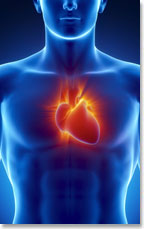 Studies examining the effects of water-only fasting on patients with heart disease began in the 1960s with Garfield G. Duncan who noticed improvements in chronic cardiac disease. Researchers have found fasting beneficial in the treatment of a variety of cardiovascular issues, including improving arterial health, reducing triglycerides, atheromas, and total cholesterol, increasing HDL/cholesterol ratios, and alleviating congestive heart failure.
Studies examining the effects of water-only fasting on patients with heart disease began in the 1960s with Garfield G. Duncan who noticed improvements in chronic cardiac disease. Researchers have found fasting beneficial in the treatment of a variety of cardiovascular issues, including improving arterial health, reducing triglycerides, atheromas, and total cholesterol, increasing HDL/cholesterol ratios, and alleviating congestive heart failure.
In a study by Horne et al. (2008), scientists evaluated the association of the religious preference of fasting with coronary artery disease (CAD). The researchers proposed that Mormons had a lower cardiac mortality rate because they routinely fasted for at least one day per month. The study evaluated potential CAD-associated effects of fasting using patients (n(1) = 4,629) enrolled in the Intermountain Heart Collaborative Study registry and another set of patients (n(2) = 448).
According to their report, “fasting was associated with lower risk of CAD (64% vs 76% CAD; OR 0.55, 95% confidence interval 0.35 to 0.87, p = 0.010), and this remained after adjustment for traditional risk factors (OR 0.46, 95% confidence interval 0.27 to 0.81, p = 0.007). Fasting was also associated with lower diabetes prevalence (p = 0.048)” (p. 814). As an observational study, this research was limited by the inability to assure that all potential confounding variables were fully controlled for.
The benefit of fasting in the prevention of the formation of a thrombus has been documented. In one study, 22 healthy volunteers were fasted and their blood was analyzed. The study found that fasting reduced blood plasma and red cell coagulation, as well as the deterioration of platelet aggregation. Additionally, there was an increase in oxidized hemoglobin content and red cell resistance to peroxide hemolysis. The researchers concluded that fasting was an effective therapy for lowering the risk of intravascular coagulation and thrombus formation. Other research has found that after 36 hours of fasting, fibrinolysis (the breakdown of clots) increases significantly. This activity continued for 24 hours after the termination of the fast.